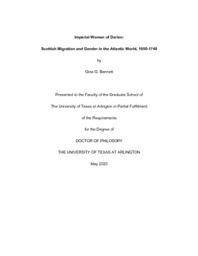
ATTENTION: The works hosted here are being migrated to a new repository that will consolidate resources, improve discoverability, and better show UTA's research impact on the global community. We will update authors as the migration progresses. Please see MavMatrix for more information.
Show simple item record
| dc.contributor.advisor | Zimmer, Kenyon | |
| dc.creator | Bennett, Gina G | |
| dc.date.accessioned | 2022-07-14T13:02:08Z | |
| dc.date.available | 2022-07-14T13:02:08Z | |
| dc.date.created | 2020-05 | |
| dc.date.issued | 2020-06-03 | |
| dc.date.submitted | May 2020 | |
| dc.identifier.uri | http://hdl.handle.net/10106/30673 | |
| dc.description.abstract | In the last two years of the seventeenth century, approximately 3,000 people, mostly Scottish merchants, soldiers, sailors and their families, migrated to a small coastal region in central America for the purpose of establishing a colony in Panama. These travelers personified the financial dreams of some elite Scottish merchants when they formed a joint stock company known as The Company of Scotland Trading to Africa and the Indies in 1696. The colony of New Caledonia ultimately proved unsuccessful and ended in the first years of the eighteenth century. Because of the failure of the Darien Scheme and its close associated with the union of Scotland and England in 1707, much of the history surrounding the creation of the colony centers on economics and state-formation, usually from an elite perspective. These views tend to shield any view of the individuals who lived outside the privileged sphere of influence, leaving them understudies in their own history. Was the creation of the Company supported merely by men of influence? Can a more complex understanding of empire creation emerge when examined through the lens of a gendered analysis?
This dissertation returns to the familiar sources to answer these questions of the Company's creation to argue that women were active participants in all stages of empire associated with the short lifespan of The Company of Scotland Trading to Africa and the Indies. Women in Scotland, and in some cases beyond, chose to associate themselves with the Company and acted as investors who supported the transatlantic venture. Women contracted in their own names and provided material for trade and comfort of the travelers making the journey to Panama. Women's networks were instrumental when deciding to invest and sell their goods or labor to the Company directors. Women's kin networks were central to decisions made regarding migration with the Company. The numbers of women associated with the Company expanded even further with the union between England and Scotland in 1707 and led women to seek compensation as investors or kin who lost loved ones associated with the colony. While the settlement failed, this dissertation explains the ways that women's support reinforced the economic and material goals of empire in Scotland that can be traced throughout the first decades of the long eighteenth century Atlantic world. | |
| dc.format.mimetype | application/pdf | |
| dc.language.iso | en_US | |
| dc.subject | Women's history | |
| dc.subject | Empire | |
| dc.subject | Migration | |
| dc.subject | Joint stock company | |
| dc.subject | Scotland | |
| dc.subject | Gender | |
| dc.subject | Darien | |
| dc.subject | Atlantic world | |
| dc.subject | Transatlantic history | |
| dc.subject | History | |
| dc.subject | Labor | |
| dc.subject | Investor | |
| dc.subject | Merchant | |
| dc.subject | West Indies | |
| dc.subject | Seventeenth century | |
| dc.title | Imperial Women of Darien: Scottish Migration and Gender in the Atlantic World, 1650-1740 | |
| dc.type | Thesis | |
| dc.date.updated | 2022-07-14T13:02:08Z | |
| thesis.degree.department | History | |
| thesis.degree.grantor | The University of Texas at Arlington | |
| thesis.degree.level | Doctoral | |
| thesis.degree.name | Doctor of Philosophy in Transatlantic History | |
| dc.type.material | text | |
Files in this item
- Name:
- BENNETT-DISSERTATION-2020.pdf
- Size:
- 5.137Mb
- Format:
- PDF
This item appears in the following Collection(s)
Show simple item record


